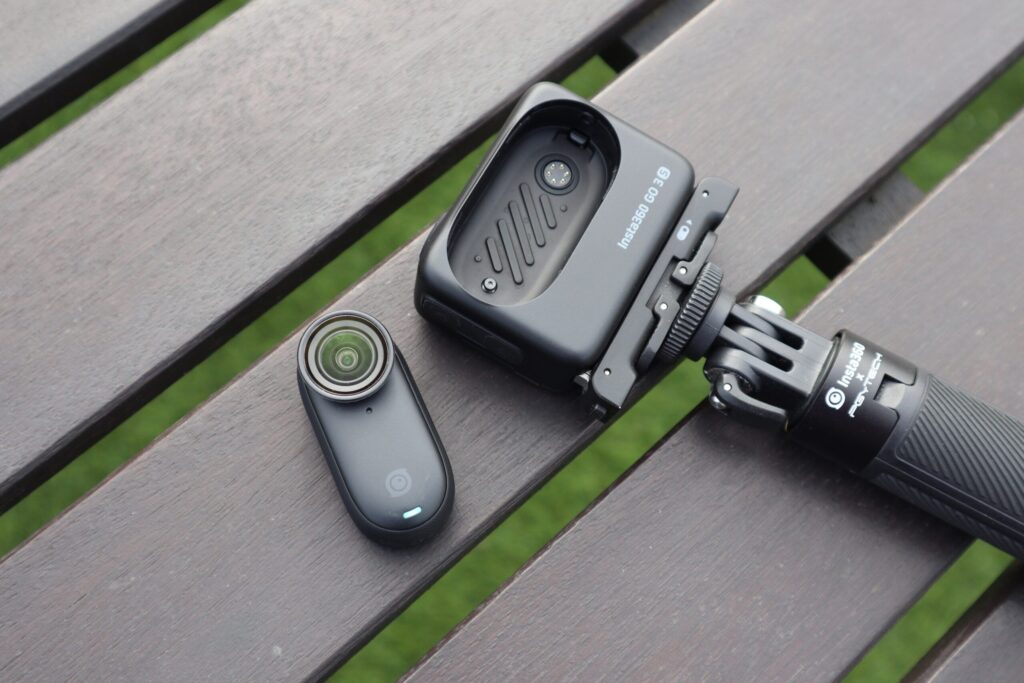Verdict
Now that it can shoot in 4K, the Insta360 Go 3S is easily the go-to action camera that I’ll recommend to most people, whether they be content creators or casual videographers who just want to capture their next holiday.
With that said, the downgrade in battery life may make the Insta360 Go 3 a better buy for some, and there’s a definite slant towards iPhone users with several Apple-exclusive features that are sure to make Android users feel hard done by.
Still, there’s plenty to love here and as of yet, nothing comes close to the level of portability the Go series offers.
Pros
- 4K, finally
- Find My compatibility
- Still unbeaten on portability
Cons
- Low-light performance is better, but not great
- Battery downgrade
-
4K Capture:The Go 3S has made the leap from 2.7K to 4K -
New FOV:Capture even more with MegaView mode -
One-touch recording:Start capturing video from a single button press
Introduction
Hot off the heels of a third major iteration for its miniature action camera, Insta360 has released a small, mid-generation update with the Insta360 Go 3S.
Aside from being one of the best products I tested last year, the Insta360 Go 3 has since been my go-to recommendation for anyone looking to make their foray into the world of content creation.
Being incredibly versatile and very simple to use, you can do quite a lot of things with the Go 3 that simply aren’t possible on pricier, traditional action cameras.
Still, that update was several years in the making, so I was a little surprised to see Insta360 reach out so soon after the fact with more news regarding the Go line. I’ve spent the last few months testing out the Insta360 Go 3S to see if this 4K-focused mini-update is now the better product of the two. Here’s my verdict.
Design
- Almost identical to the Insta360 Go 3
- Two colours available at launch
- Tweaked accessories
If you’re a bit unsure about how to tell the difference between the Go 3 and the Go 3S, you’re not alone. In fact, I made sure to get the Black version of the Go 3S so that I wouldn’t confuse it with my white Go 3. Still, there is a tell.
If you look a little more closely you’ll notice that the lens guard is slightly bigger than before, and there’s now a textured grip that runs along the sides of the camera, making it ever so slightly easier to hold on its own.
It’s also more waterproof than before, with the ability to withstand depths up to 33ft, as opposed to the previous cap of 16ft on the Go 3.

This might sound a little unexciting but it’s hardly to the Go 3S’s detriment as it helps to make the camera more robust when used on location, whilst still holding onto the yet unrivalled portability that makes the Go range such a great option for filmmakers.
The bundled accessories have also been given minor tweaks in the same vein in order to improve overall usability, such as the Easy Clip now having a stronger magnetic pull to ensure that the Go 3S never comes loose during more intense moments, such as downhill biking.
Both the miniature design and included accessories work so well that I’m still surprised that the likes of DJI and GoPro haven’t attempted something similar to attract this end of the market.
Screen and Performance
- Now works with Apple’s Find My network
- Faster transfer for sending files to your phone
- Screen is responsive and easy to read outdoors
While the design of the Go 3S itself has a few minor tweaks, the Action Pod that houses the camera has retained the same DNA as the Go 3. The 2.2-inch display gives you just enough room to see your preview without needing to squint, and the screen itself is incredibly responsive as you jump between different modes and camera settings.
On the software side things are a little different, although the bulk of the upgrades here are only available to iPhone users; sorry Android fans.
For starters, Insta360 has brought in the one feature I never realised I needed in the form of Find My compatibility. This means that you can add the Go 3S to your list of associated devices in the Find My app, and not only keep tabs on where it’s currently located (or its last known location), but also receive notifications to let you know if you’ve left it behind somewhere.


Given just how small the Go 3S is, this feels like a much needed feature as it’s all too easy for the camera to go unnoticed at the bottom of a bag or be hidden out of view by a stack of papers on your desk. It’s a shame that Android users don’t get the same functionality via Google’s Find My Device alternative, but it’s certainly better than nothing and I’d love to see more of the competition think about extended features like this.
Whenever you’ve shot some new footage, you’ll receive a notification on your phone right away to let you dive into the editing suite and tweak things how you see fit. This is perfect for getting out a quick video to social media when you’re strapped for time, but again this is only available on iOS.
What is available across both sets of ecosystems is the new Quick File Transfer button that appears in the bottom right corner of the screen when looking back at captured footage. So long as you’re connected to your phone via the Insta360 app, you can simply tap that button and have your chosen file sent over immediately. It would be handy if you could do this without needing to open the app, but it definitely speeds up the process a bit.
Video and Image Quality
- The Go 3S can now shoot at 4K
- The new MegaView mode feels like an evolution of ultrawide
- Low light performance is improved but not great
One of the key complaints I had with the Insta360 Go 3 was that for all its portability prowess, its 2.7K capture ceiling was too far behind the competition to make it truly tempting to professionals who wanted an easier means of recording quick bits of footage.
While I can’t say for sure, it does seem as though the folks at Insta360 kept a keen eye on feedback as the jump to 4K is now the big selling point of the Go 3S, and it has every reason to be.
Video quality was already quite good on the Go 3 in spite of the compromise, but now everything is far more detailed on the Go 3S, offering up a great deal more flexibility for zooming and cropping footage after the fact.
Just like its predecessor, the Go 3S is undeniably at its best during the daytime, collecting rich colours from its environment, even during overcast days.
I took the Go 3S to a particularly cloudy beach in Ireland but the footage still had great separation in colours between the sand, sea and sky. This is made even better by the new MegaView FOV.


In terms of scope, MegaView and ultrawide capture about the same amount of a given scene but the former does away with the fisheye distortion that the latter is known for, giving you a level of ultrawide photography more akin to what you’ll find on a smartphone.
I’ve never been a big fan of the fish-eye lens so having this here feels like a boon as I didn’t have to reach for my iPhone 15 in the way that I might have done beforehand.




One issue I had with the Go 3 was its low light performance and unfortunately, it’s still a hurdle here. Taking the Go 3S down to the graffiti-laden Leake Street tunnel, the Go 3S struggled to maintain its focus as I moved with the camera. However, I did notice that when remaining stationary, the Go 3S did achieve some success in replicating the colours of the shadowed graffiti, so there is some flexibility here if you’re using a tripod.
Still, low-light performance as far as I’m concerned is a minor blemish in the Go 3S’s repertoire. In addition to 4K video, stills also look great under the right conditions and the mic did a terrific job of picking up my voice, even against the busy backdrop of several south London hotspots.
Stabilisation and battery life
- Stabilisation is still outstanding, even when filming handheld
- Overall battery life is lesser than on the Insta360 Go 3
At this point, you’re probably thinking that the Insta360 Go 3S is a clearcut upgrade across the board, but that technically isn’t true. Even though 4K and Find My compatibility are great additions, there is one step back and that’s in the device’s battery life.


For comparison, the Go 3 was able to run for up to 45 minutes on its own, bumped up to 170 minutes when the Action Pod was brought into the fold. This time around it’s 38 minutes when the Go 3S is taken out of the Action Pod, and 140 minutes when housed within it.
When putting that claim to the test, our results came up a little shorter than that. I was able to get the Insta360 Go 3S to shoot for 33 minutes unhoused from the Action Pod before it needed to shut down.
When both components are used at once, the battery on the Action Pod dropped to 79% after 30 minutes of 4K 30fps recording. It should be noted that the device also gets quite hot to the touch if you leave it to shoot for that long, so I wouldn’t recommend it.
Luckily Insta360’s claims of nabbing back 80% charge from a speedy 23-minute top off were found to be on the money, so you don’t have to wait long before the camera is ready to go once more.
I think that for most people (and counting myself here), the trade off, while not ideal, is worth it. However, if your footage is going straight to social media where the quality will be downgraded anyway, or you plan on having lengthy shoot days then the longer battery life of the Go 3 is probably worth sticking with, particularly when it’s available at a reduced price.
Luckily there is no downgrade to speak of where stabilisation is concerned. I still can’t wrap my head around how the Go 3S is able to produce such smooth footage, even when it’s being held between your thumb and forefinger, but it just does. At no point during filming did I ever worry that things might look a tad shaky on the front end, and that’s exactly what you want.
Latest deals
Should you buy it?
Buy if you want a super portable, 4K camera
You won’t find a 4K camera more portable than the Insta360 Go 3S, so if you want to keep your vlogging kit light, this is your best bet.
Don’t buy for low-light performance
For those looking to shoot at all hours of the day, you may be better suited with either the Insta360 Ace Pro or the DJI Osmo Action 4.
Final Thoughts
I adored the Insta360 Go 3, and in so many ways, the Go 3S is exactly the upgrade I was looking for. 4K capture now adds more detail to your footage than ever, while Find My integration is one of those features I didn’t realise I needed until I used it. Insta360 could leave the Go 3S alone for a few update cycles and I don’t think I’d find myself longing for something else.
Of course, for the most robust capture quality out there, you’re better off checking out more traditional action cameras like the GoPro Hero 12, or the DJI Osmo Pocket 3 if money is of no object, but it’s in sheer portability that the Go 3S can’t be bested. The only thing that comes close is its predecessor, which can now be bought for less and has a slightly better battery life.
How we test
We thoroughly test every action camera we review. We’ll always tell you what we find and we never, ever, accept money to review a product.
Tested over several months
Compared against existing action cameras for a comprehensive verdict
FAQs
At the time of writing, the Insta360 Go 3 is only compatible with Apple’s Find My network.
UK RRP
USA RRP
EU RRP
CA RRP
AUD RRP
Manufacturer
IP rating
Battery
Release Date
Image stabilisation
Bluetooth
›


